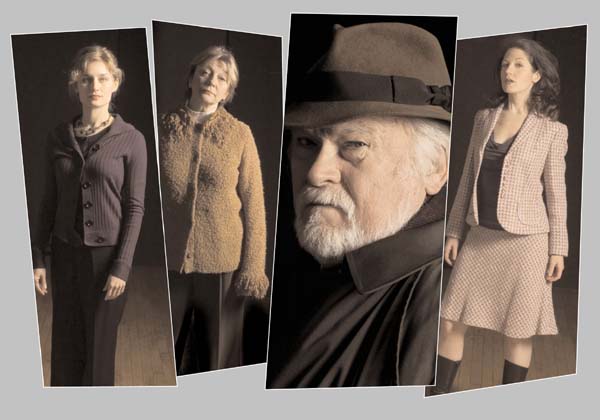All the Colors of “Honour”: Theater at the Jungle
Jaime Kleiman gives us "Honour" at the Jungle Theater--a superb match of text and actors.

Many of us are ingrained from birth to think about a traditional version of the future, one that includes the expected accoutrements of security: a spouse, children, a job; etc. This presumes, of course, that one’s individual future conforms to a template akin to a cultural coloring book, an outline of what life should be. Most of us do our best, coloring in the blanks while struggling to find nuance – and our best selves – contained within this societal structure, the one that promises true happiness but never quite delivers. Often, we end up in a sort of stasis – a life that is content, safe, and familiar. But is this happiness? Is it love?
Such are the themes in Australian playwright Joanna Murray-Smith’s Honour, a brutal examination of a disintegrating 32-year marriage and the consequences of selfish love. Told in a series of two-person scenes, the production is practically flawless from start to finish. Real-life spouses Allen Hamilton and Camille D’Ambrose play the couple, George and Honour, superbly. Honour, we learn, gave up a promising poetry career to become a wife and mother, while George became an iconic writer. At the start of the play, he is being interviewed by Claudia, a calculating, beautiful young journalist. George mistakes her cold-hearted ambition for passion, an emotion he no longer feels. Hoping to revitalize himself, and blaming his three-decade marriage for his lack of fulfillment, he leaves his wife for Claudia. Claudia, meanwhile, couldn’t be happier; while George attempts to share her vitality, Claudia successfully siphons his humanity, his professional contacts, and his devotion. Carolyn Pool is fantastic as the vivacious and unapologetic Claudia, swinging her long brown hair like a weapon as she uses words to attack and plunder the emotions of the people around her.
Sophie, George and Honour’s 24-year old daughter, is a bright young woman held back by her insecurities and idealism, a foil for the Claudias of the world. Tracey Maloney provides a touching and funny portrayal of a young woman treading water between her heartbroken mother and her self-absorbed father. A former schoolmate of Claudia’s, she is both attracted to and repelled by the ease with which Claudia obtains her desires.
The tight-knit ensemble inhabits the world of the play completely, illuminated by the stark, colorless set, with its tall doors suggestive of secrets and possibilities that we never get to see. It’s clear from Bain Boehlke’s direction (and the script) that George and Claudia are meant to be seen as the selfish ones, people who will never be capable of love because they can’t deny themselves anything, and see compromise as acquiescence. Ultimately, though, this is Honour’s story and, like the vase of vibrant flowers sitting on an otherwise black set, she blossoms from her emotional tragedy. D’Ambrose’s subtle portrayal of a strong woman rediscovering her inner fire is invigorating, to say the least.
Honour is a prescient reminder that love, like all fully human experiences, is much more complicated than what we were initially promised, when the outline of personhood was contained in a coloring book, and crayons came in only a few vibrant shades.